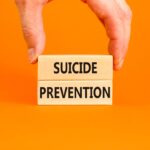Suicide is the act of intentionally ending your life.
There are three levels of intervention in suicide; 1) universal 2) selective and 3) indicated.
Universal interventions target everyone in a defined population. They aim to increase awareness about suicide, remove barriers to care, promote help-seeking and encourage protective factors. Some examples of universal interventions include school-based interventions and national initiatives such as restricted access to lethal means. Evidence suggests that universal interventions are effective at increasing awareness and helping skills, though there is little evidence to suggest they’re effective at reducing suicide-related thoughts or behaviours.
Selective interventions address specific groups at increased risk for suicidal behaviours, for instance those with mental health problems or harmful use of substances. To date, there have been few studies into selective interventions and results are mixed.
Indicated interventions target high-risk individuals already displaying signs of suicidal behaviour. Examples include brief contact interventions (e.g. crisis cards) and talking therapies. Evidence suggests that brief contact interventions are effective for young people in clinical settings. A network meta-analysis conducted in 2021 found that the most effective talking therapies for suicide and self-harm in young people are dialectical behavioural therapies and mentalisation-based therapies.










